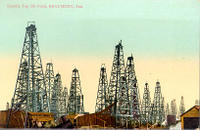 Several years ago when the West was in the grip of the Oil Shocks, Ayn Rand asked her friend Alan Greenspan what would happen if all the taxes were taken off the oil companies, including the taxes, regulations and government-imposed disincentives discouraging exploration. Greenspan laughed and said we'd have oil shooting up from under our feet. What he meant was that with a drastic drop in the costs of exploration and developments, known fields that were either marginal or uneconomic would leap into production as the financial barriers to production were removed, and exploration for new fields would leap ahead.
Several years ago when the West was in the grip of the Oil Shocks, Ayn Rand asked her friend Alan Greenspan what would happen if all the taxes were taken off the oil companies, including the taxes, regulations and government-imposed disincentives discouraging exploration. Greenspan laughed and said we'd have oil shooting up from under our feet. What he meant was that with a drastic drop in the costs of exploration and developments, known fields that were either marginal or uneconomic would leap into production as the financial barriers to production were removed, and exploration for new fields would leap ahead.Seems like he's still saying something similar thirty years later (though infinitely more nuanced), only few seem to be listening. James Glassman is listening; he's one of the few arguing against the foolish notion that taxing the "windfall profits" of oil producers will somehow ... well, somehow make oil cheaper. If that sounds stupid, it's because the proposal comes from a bunch of politicians, in this case the US Senate (Collective noun: A simpleton of Senators). As Glassman points out:
The United States has tried this before, between 1980 and 1987, and the results were hugely counter-productive, according to a 1990 Congressional Research Service report... "The WPT reduced domestic oil production between 3 and 6 percent, and increased oil imports from between 8 and 16 percent," says the report....When governments tax tobacco, everyone gets excited that this will discourage smoking. Why then when governments tax oil exploration and oil production do people exhibit surprise that this discourages both. You'd have to be a simpleton not to see the wider implication -- or maybe just a Senator.
Energy companies are in a very risky business. They (and the investors and lenders who back them) commit hundreds of billions of dollars annually to searching for oil and gas, and to building or expanding refineries, ports and pipelines. These projects take many years to complete and the pay-off down the road is highly uncertain. It's tough enough to make investment decisions in anticipation of market conditions that can change overnight, but why spend vast sums to develop energy if -- as a reward -- government hits you with a special tax? So, with a Windfall Profit Tax (WPT), oil companies cut back.
Linked article.
[UPDATE: "The price of oil remains high only because the cost of oil remains so low." Peter Huber and Mark Mills explain the numbers involved with oil exploration and extraction in January's Wall Street Journal -- "The market price of oil is indeed hovering up around $50 a barrel on the spot market. But getting oil to the surface currently costs under $5 a barrel in Saudi Arabia, with the global average cost certainly under $15. And with technology already well in hand, the cost of sucking oil out of the planet we occupy simply will not rise above roughly $30 a barrel for the next 100 years at least."]
No comments:
Post a Comment